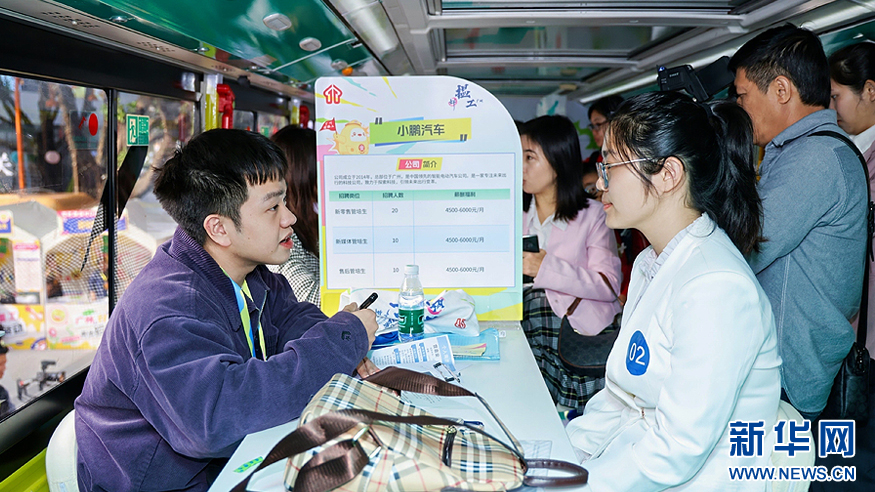
Development of new quality productive forces and growing manufacturing strengths in the Guangdong-Hong Kong-Macao Greater Bay Area (GBA) are creating widespread job opportunities, with experts and young talents envisioning promising prospects in the employment market.
Talent demand in nine Guangdong cities in the Greater Bay Area surged in the first half of the year, with job postings in the region accounting for 12 percent of the national total, according to a report released by Peking University HSBC Business School and online recruitment platform Zhaopin on Monday.
Shenzhen and Guangzhou remained the region’s economic and hiring powerhouses, accounting for nearly 70 percent of recruitment demand — Shenzhen at 35.2 percent and Guangzhou at 31.8 percent.
READ MORE: Job market stable as youth unemployment rate drops
Emerging industries including high-tech and digital economy are playing an increasingly important role in the Greater Bay Area. The professional services/consulting sector accounted for the largest share of recruitment demand at 22.6 percent, followed by electronics/semiconductors/integrated circuits sector and internet/e-commerce sector, taking up 8 percent and 7.9 percent, respectively.
The southern region’s manufacturing foundation has remained strong, as jobs on offer in sectors involved in the industrial chain, including heavy equipment, processing and automotive, accounted for a combined 8.5 percent.
Significant growth in elderly care recruitment and demand for Internet of Things (IoT) and artificial intelligence (AI) roles has been seen in the 11-city cluster, which is a reflection of an ageing population and a strategic push towards technological advancement.
According to the report, job openings in elderly care rose 28.9 percent year-on-year in the first half, while resident services increased by 13.9 percent. Meanwhile, posts in IoT and AI grew 14.7 percent and 5.6 percent, respectively.
Modern services have seen the largest demand in Shenzhen and Guangzhou, as population growth in the two first-tier cities has boosted the development of tertiary industry. While Shenzhen saw a 120.9 percent year-on-year surge in elderly care job demand in the first six months, resident services recruitment in Guangzhou doubled. The number of permanent residents in Shenzhen and Guangzhou increased by 199,400 and 151,000 last year, respectively.
Automation process in Zhongshan and Huizhou is gaining steam, posting strong gains of 77.7 percent and 54 percent in job opportunities, respectively, in the first half compared with the same period earlier.
Meanwhile, hiring vibrancy was shown in Foshan and Dongguan in transport and logistics sectors as the two cities continued to cement their status as major manufacturing hubs.
The report came as Guangdong ramps up efforts to strengthen its talent acquisition strategy and bolster economic growth. The provincial government launched a new initiative in February, aiming to attract one million university graduates to work or step up business in the province by offering competitive positions and salaries.
As part of the campaign, major recruitment events were launched in eight Chinese mainland cities — Beijing, Shanghai, Hangzhou, Wuhan, Xi’an, Chengdu, Changsha and Nanjing — in April, with each providing over 10,000 jobs.
“Since the launch of the Outline Development Plan for the Guangdong-Hong Kong-Macao Greater Bay Area in 2019, the region has achieved remarkable progress in talent construction by leveraging the ‘one country, two systems’ advantage as well as its technological and industrial strengths,” said You Aiqiong, director and researcher of provincial talent development research center at Guangdong Academy of Social Sciences.
READ MORE: Hong Kong youngsters look to GBA cities for career
“The structure of talent needs is changing with the demand increasingly driven by technological innovation. As traditional manufacturing transitions to digital intelligence, demand for AI-related, high-skilled professionals and versatile talent with both software and hardware expertise will continue to grow. High-level talent in finance, biomedicine and healthcare sectors will also be sought-after in the job market.”
Liu Ziqi, a postgraduate from eastern Jiangsu province, said she opted to start work in Shenzhen, instead of returning to her hometown, as the Greater Bay Area could offer “wider development space” for her career.
“The dynamic atmosphere here is inspiring and I see a lot of potential for personal and professional growth,” she added.
Chen Yang contributed to this story.
Contact the writer at sally@chinadailyhk.com


